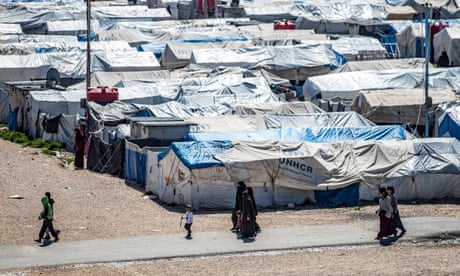- by foxnews
- 08 Apr 2025
Australian boy, 11, held in Syrian camp begs for flight home: ‘I want to feel safe’
Australian boy, 11, held in Syrian camp begs for flight home: ‘I want to feel safe’
- by theguardian
- 08 May 2023
- in news

Australian children held inside Syria's Roj detention camp wait at the gates for the van they hope will take them out, and take them home.
An Australian-born boy who has been held in the camp more than three years told Guardian Australia this week the children were desperate to go home.
"I just want to know how it will be, to feel normal, to go to school and make friends, and to go to the park and play," the 11-year-old said. "And most of all I want to know how it will feel to go to sleep and be safe.
"A lot of boys already went back to their country, living a normal life and going to school - why this can't happen to me?"
About 40 Australians - 10 women and 30 children - remain held within the Roj camp in north-east Syria, near the Iraqi border.
They are the wives, widows and children of slain or jailed Islamic State fighters: most have been held in the squalid detention camp more than four years. Conditions are "dire", the Red Cross says, and the security situation "extremely volatile".
The Guardian understands there are Australians, too, held inside al-Hol camp, south of Roj, far larger and considered significantly more dangerous.
Just this week Syrian Democratic Forces "apprehended a terrorist [inside the camp] who was responsible for supplying weapons to active terrorist cells in al-Hol, enabling them to carry out killings and assassinations".
In October the Australian government repatriated three women and 14 children from Roj camp. It has committed to bringing home the remaining Australians it can safely extract but has given no commitment as to when.
One Australian teenager, Yusuf Zahab, died last year after being separated from his family. He was 11 when he was trafficked into Syria.
Australian families have been told, as recently as this month, that they face having their sons forcibly removed from the camp.
"Sometimes when I hear a car I get scared they are going to take me away from my mum and from my family," the Australian boy told the Guardian. "And I don't want to go to prison because I've already been there and I don't want to go there ever again."
Sources inside the camp say repatriations of foreign nationals - from Iraq, France, Spain, Canada and Norway - are occurring regularly, and the Australian children wait often at the barred main gates for the van they hope will take them out.
A source inside Roj said helicopters often fly overhead preceding an evacuation. "And you have little three-and-four-year-olds chanting 'please take us home'."
When vehicles arrive at the gates, "each time they ask 'is it for us?'".
Most of the small Australian cohort live near each other in a row of tents known as "Australia Street". With the US and European nations repatriating their citizens, the Australians are some of the last western nationals remaining.
The 11-year-old boy suffers from severe respiratory conditions, exacerbated by air pollution caused by nearby oil wells, and northern Syria's climate extremes.
"Once I had an asthma attack, and I was in the toilet and I thought I was going to die because there were no doctors here."
Australia has undertaken two repatriation missions from detention camps in north-east Syria. In 2019, eight orphaned children, including a pregnant teenager, were returned to New South Wales from the camps.
And in October the four women and 13 children were brought back from Roj, also to NSW.
Of the women returned to Australia last year, one, Mariam Raad, has been charged with entering, or remaining in, a "declared area" in 2014 - Syria's al-Raqqa province, which was then under the control of Islamic State - in breach of federal law. Her case is before a NSW court.
Other women returned to Australia are expected to face charges under Australian law. They have not been charged with crimes overseas.
All members of the Australian cohort inside Roj camp - 12 families - have had their identities confirmed by the Australian government. They are Australian citizens and legally entitled to re-enter the country. Several Australian families in the camp are part of an imminent legal challenge in an Australian court to compel the government to repatriate them.
A spokesperson for the department of home affairs said the Australian government was concerned about Australians still in the camps, but emphasised "repatriations require a whole-of-government approach".
"There are many security, diplomatic, community and welfare considerations that need to be addressed.
"Our approach will be driven by national security considerations, and as such, we cannot comment further."
Some of the children were born in the camp and have never been outside it. Many of the women say they were coerced, tricked or forced into travelling to Syria by husbands who have since died.
The Australian boy told the Guardian: "My mum always tells me about the beautiful places in Australia - like [the] desert and the museum.
"I dream about being in Australia with my family. That's where I was born."
- by foxnews
- descember 09, 2016
Ancient settlement reveals remains of 1,800-year-old dog, baffling experts: 'Preserved quite well'
Archaeologists have recently unearthed the remarkably well-preserved remains of a dog from ancient Rome, shedding light on the widespread practice of ritual sacrifice in antiquity.
read more


